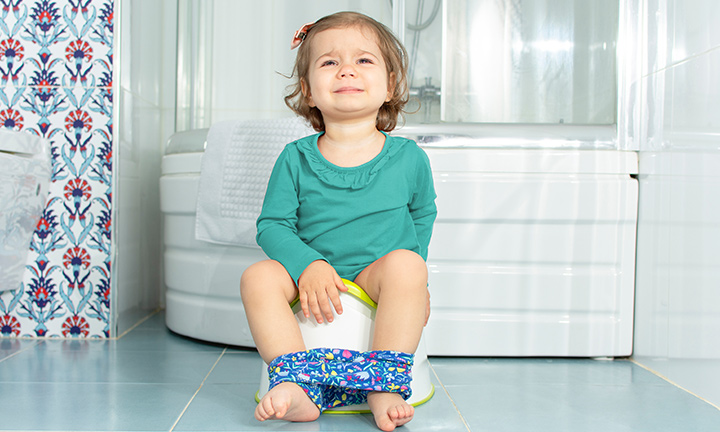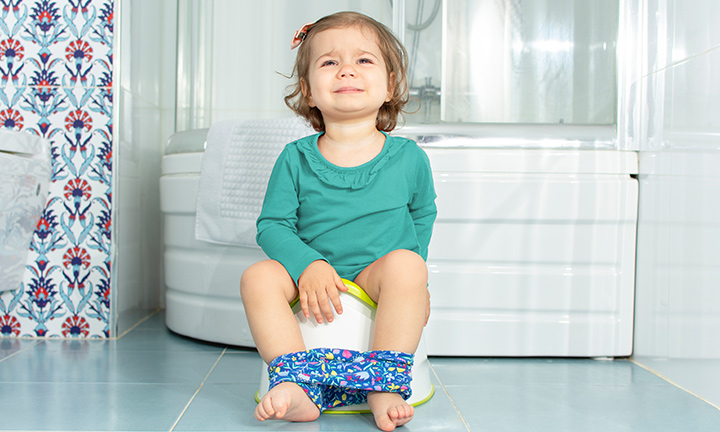Relieve Toddler Constipation: Causes & Solutions

Discover gentle solutions for toddler constipation! Learn about causes, symptoms, and effective treatments. Relieve your child’s discomfort with expert guidance.
Understanding Constipation in Toddlers: Causes, Symptoms, and Treatment
Introduction

Constipation in toddlers can be challenging, and as parents, we want to help them feel better. When your little one is struggling and in discomfort, try to pass hard poop. This blog will guide you through the causes, symptoms, and treatment of toddler constipation. We’ll use simple words to explain everything so you can understand and help your child.
Constipation in Toddlers:
Constipation in toddlers is a common digestive issue characterized by infrequent bowel movements, hard or dry stools, and difficulty passing stool. Understanding its causes, symptoms, and treatment is essential to ensure your toddler’s well-being.
Causes of Constipation in Toddlers:
- Dietary Factors:
A lack of fiber can contribute to constipation. Imagine your toddler struggling in discomfort, making strained noises as they try to pass hard, pebble-like poop. It can be painful, and they might cry or sound distressed. - Dehydration:
If your child doesn’t drink enough fluids, they may experience difficulty passing hard stools. You might notice your child making grunting sounds or expressing frustration as they strain to have a bowel movement. The poop is dry and hard, making it difficult for them to pass. - Toilet Training:
Some children may withhold bowel movements due to fear or discomfort during the toilet training. Listen for changes in your child’s bathroom habits. If they haven’t had a bowel movement in two weeks, it’s a cause for concern. It’s time to consult a doctor to ensure they get the help they need. - Medications:
Certain medications, such as antacids or some pain relievers, can cause constipation as a side effect. Sometimes, your child might produce a bit of runny poop that seems to slip out without them knowing. It’s often due to a larger mass of stool blocking the way, and they may not even realize it’s happening. - Medical Conditions:
Constipation may indicate an underlying medical issue like hypothyroidism or irritable bowel syndrome. Your child might become irritable and complain of stomach aches or soreness, which you can hear in their voice. They may refuse to eat, and their discomfort will be evident in their tone.
Symptoms of Constipation in Toddlers:
- Imagine your toddler struggling in discomfort, making strained noises as they try to pass hard, pebble-like poop. It can be painful, and they might cry or sound distressed. You might notice your child making grunting sounds or expressing frustration as they strain to have a bowel movement. The poop is dry and hard, making it difficult for them to pass.
- Listen for changes in your child’s bathroom habits. If they haven’t had a bowel movement in two weeks, it’s a cause for concern. It’s time to consult a doctor to ensure they get the help they need. Sometimes, your child might produce a bit of runny poop that seems to slip out without them knowing. It’s often due to a larger mass of stool blocking the way, and they may not even realize it’s happening.
- Your child might become irritable and complain of stomach aches or soreness, which you can hear in their voice. They may refuse to eat, and their discomfort will be evident in their tone.
Treatment for Constipation in Toddlers:
- It’s essential to ensure your child consumes a nutritious diet that includes fiber-rich foods such as whole grains, vegetables, and fruits. Remind them to drink enough water for their health and well-being. Imagine the joy in your voice as you offer these delicious and nutritious options to your child.
- Help your kids stay fit and strong by teaching them healthy eating habits. Ensure your child follows a routine of healthy meals, regular exercises, and outdoor games. Imagine yourself enthusiastically encouraging your child to stay active and fit.
- Discourage high-fat and high-sugar diets for your child using a firm but gentle tone. Encourage your child to listen to their body and not hold back when they need to poop. In soothing words, it’s essential to empty their bowels whenever they feel the urge and reassure them that the toilet is clean and safe.
- During diarrhea episodes, provide soothing sounds of comfort as you offer your child fluids like water, rice water, tender coconut water, and oral rehydration salts (ORS) to prevent dehydration. Imagine using gentle and comforting tones to ensure they feel cared for.
- Guide your child to the toilet after meals with encouraging words, aiming for about three times a day to establish a routine. Imagine using encouraging and motivating words to create a positive toilet routine.
- If you suspect cow milk intolerance is causing chronic constipation, consult a doctor for guidance. Use a concerned and responsible tone when discussing potential medical issues.
Conclusion:
Help your toddler’s constipation by changing their diet, keeping them hydrated, and following a routine. If your toddler shows persistent or severe symptoms or if you have health concerns, consult a healthcare provider. Your soothing and caring presence can help your toddler cope with the discomfort of constipation and recover more quickly.






